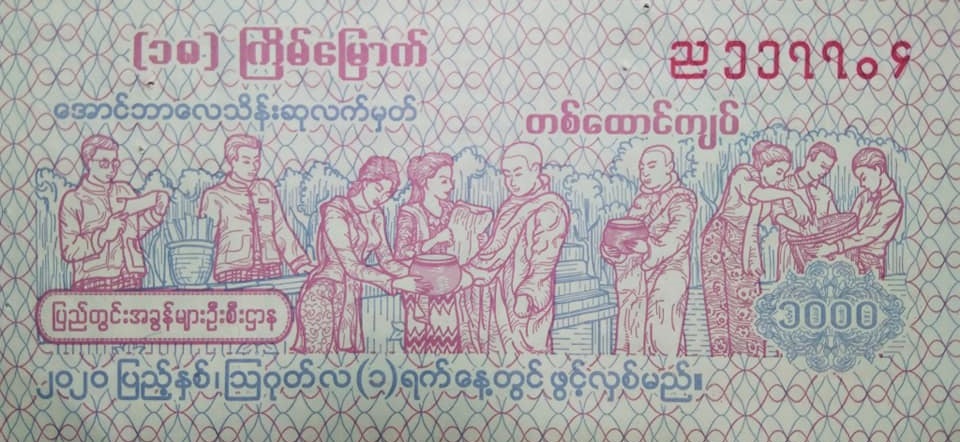For the first time in its long, 143-year history, Myanmar’s national lottery is being boycotted by the public, as Myanmar people refuse to make any kind of payments to the military regime that seized power in a coup on Feb. 1.
As part of a wider Civil Disobedience Movement against the regime, the public has been boycotting any payments, including paying taxes and utility bills and buying lottery tickets.
As a result, the regime was recently forced to postpone the lottery draw and reduce the 1.5-billion-kyat (about US$911,000) first prize to 500 million kyats. It has also been unable to pay the prizes in full to the winners amid a cash shortage.
Once a common sight, lottery shops and lottery ticket hawkers have now vanished across the country, reflecting strong public opposition to the regime and marking a significant event in the history of Myanmar’s state lottery.

According to historical records, the first state lottery was introduced in 1878 when Myanmar’s last monarch, King Thibaw, ascended to the throne. It was hugely popular with the public, as only 10,000 kyats of the sales revenues of 60,000 kyats went to the treasury of the Mandalay court; the remainder was distributed as prizes.
No wonder Mandalay folks were lured to buy lottery tickets, as the first person to win first prize, Mi Ohn, was paraded around the town on an elephant, the royal tusker only for royal family members and high-ranking ministers at the time. However, the lottery became so popular that people were not engaging in other businesses, forcing King Thibaw to halt the lottery in 1881.
The king even wrote off taxes for subjects who fell into poverty due to buying too many lottery tickets, and paid off their lottery-related debts for them, leading to the Burmese saying that “The king would pay for you if you are in debt.”
There was no lottery in the decades that followed the British occupation of all of Myanmar and their sending of King Thibaw into exile. The current lottery was introduced in 1938, shortly before World War II, as the British wanted to raise revenues in colonial Myanmar (then Burma). Again, people from both urban and rural Myanmar went crazy about the lottery. The first winner of the first prize was U Ne from Mon State’s Thaton.
Anti-colonial activists tried to persuade the people not to buy lottery tickets, but few could resist their lure. In successive periods after Myanmar’s independence, the public continued to indulge in fantasies of winning lucrative prizes.
Its popularity grew further when the jackpot was increased to 1.5 billion kyats under the since-ousted National League for Democracy government led by Daw Aung San Suu Kyi. At the time, lottery shops were a common sight at crowded junctions, and lottery ticket hawkers pushed their carts along the streets while playing loud music.
Things have completely reversed since the military’s Feb. 1 coup, as people began to boycott military-linked products and payments to the regime after it killed hundreds of pro-democracy protesters. The great majority of the people have boycotted the state lottery since its management was taken over by the military regime led by Senior General Min Aung Hlaing.
As the popularity of the state lottery, known as Aung Bar Lay, declined, the National Unity Government (NUG) formed by the ousted NLD government and other ethnic representatives in April announced a plan to run its own lottery to raise funds for civil servants who are on strike to protest against the regime.
The “Victorious Spring” lottery, named after Myanmar’s popular revolution against the junta, was launched on Aug. 15. All 50,000 tickets put up for sale were sold out in just over one hour on the launch day despite the regime’s official threats to punish anyone who plays. And people bought the tickets not for the money, but for the merit.
On Aug. 18, four days after the Victorious Spring lottery was launched, the junta-controlled Aung Bar Lay lottery department announced that the lottery prizes would be increased from 60 percent of sales revenues to 70 percent. And the prizes will be paid in full at once; previously, those who won large prizes were paid their jackpots in installments. Many believe the move is aimed at competing with the NUG’s lottery. It remains in question whether people will buy Aung Bar Lay lottery tickets, despite the regime’s promotion efforts. The military regime is unaware—or at least pretends to be unaware—that people are not playing its lottery not because the prizes are small, but out of a determination to show their opposition to the military in whatever way they can. The fact that the public is boycotting the state lottery for the first time in 143 years shows just how much people loathe Min Aung Hlaing’s regime.
You may also like these stories:
We Believe Nothing From a Dog’s Mouth: Myanmar Democracy Activist
Myanmar Junta Boss Min Aung Hlaing’s Delusions of Grandeur
Myanmar Migrant Workers in Mae Sot Get Free COVID-19 Jabs

















